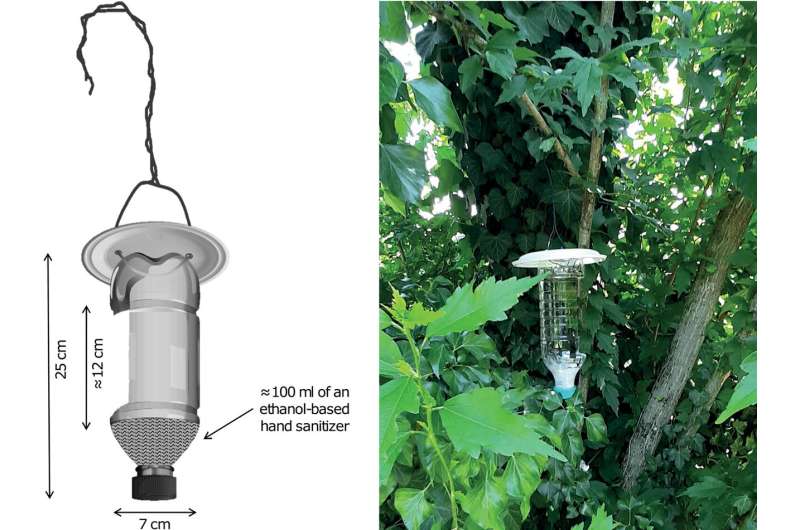This article has been reviewed according to Science X's editorial process and policies. Editors have highlighted the following attributes while ensuring the content's credibility:
fact-checked
peer-reviewed publication
trusted source
proofread
Beetles in a bottle: A message from aliens to schools

While invasive alien species (IAS) represent a growing threat to global biodiversity and ecosystems, public awareness of them hasn't seen a significant increase. Many researchers believe informing people about IAS is an essential long-term investment to counter biological invasions; in particular, "learning by doing" is an extremely effective method for involving new audiences, such as students.
About 500 Italian students aged 11-18 took part in a citizen science project that led to new geographical records of two alien species of ambrosia beetles considered to be quarantine pests by the European Union. Dr. Fernanda Colombari and Prof. Andrea Battisti of the University of Padova have described the results in a paper in NeoBiota.
The project involved schools located in urban areas in north-eastern Italy and aimed to connect environmental education and experiential outdoor learning through lectures, videos, reports, and large-scale surveillance of ambrosia beetles. The students used plastic bottles and hand sanitizer to trap ambrosia beetles in their school grounds. They then assessed their abundance, looking at the different species. Before and after the educational activities, their knowledge and awareness of IAS were tested using simple anonymous questionnaires.
"Our study aimed to both educate students and collect scientific data at sites such as schools where surveillance for potentially invasive ambrosia beetles is not usually conducted, or where it is sometimes misunderstood," Dr. Colombari and Prof. Battisti write in their paper.
Identifying the specimens collected by the students, the authors found that IAS amounted to 35% of total catches. Remarkably, two out of the four alien species caught, Cnestus mutilatus and Anisandrus maiche, were recorded for the first time in Europe thanks to this study.
Furthermore, questionnaire results showed that the students acquired greater knowledge and increased their awareness and interest in IAS by more than 50%. After the experiment, most of them were interested in learning more about the negative effects of the introduction of IAS and practices to limit their spread.
This study shows that citizen science can successfully involve school students, giving them an opportunity to contribute in an effective early detection of IAS, as most first records occur in cities or suburban areas. The results also point to the primary role of education, which is as a major driver of change in tackling sustainability challenges. Moreover, as students bring home the message and share it with their relatives, the process supports intergenerational learning and enlarges public collaboration.
"People are often unaware of the role they have in the entire invasive process," the researchers write in their study. Citizen science projects like this one are more than a reliable tool for collecting scientific data; they also help engage the public and spread awareness of biological invasions, eventually contributing to the creation of more efficient management strategies.
The monitoring program in this study was conducted in the context of the European project HOMED (Holistic management of emerging forest pests and diseases), which has developed a full panel of scientific knowledge and practical solutions for the management of emerging native and non-native pests and pathogens threatening European forests.
More information: Fernanda Colombari et al, Citizen science at school increases awareness of biological invasions and contributes to the detection of exotic ambrosia beetles, NeoBiota (2023). DOI: 10.3897/neobiota.84.95177
Journal information: NeoBiota
Provided by Pensoft Publishers





















